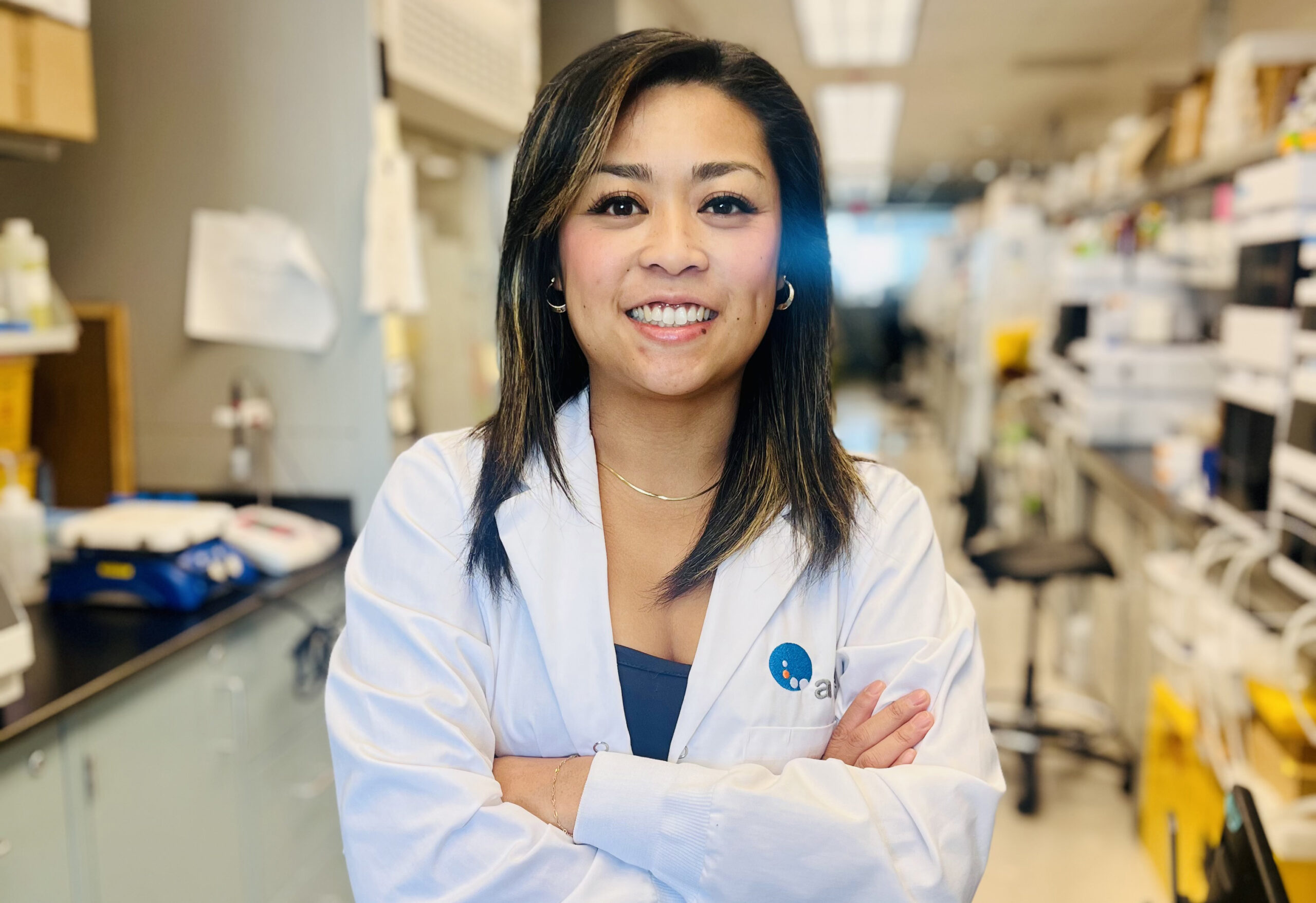As a rec league basketball player—not to mention diehard Toronto Raptors fan— Andrea-Kaye Datu is the closest thing Atuka has to a point guard both on and off the court.
Off the court, at Atuka, Andrea serves as operations manager for the lab and office at our Toronto HQ. “It’s all about supporting the important work being done in the lab every day,” she says, “and making sure our processes flow.” Which makes for a broad remit, with oversight on everything from purchasing supplies, supporting technicians, and equipment maintenance to scheduling, troubleshooting, and biohazardous waste management. “I pretty much have my hands on everything just to ensure the lab is functioning efficiently every day.”
It’s not far removed from how she describes her role on the court. “As a point guard, I’m definitely a playmaker,” she says. “I like to orchestrate the offence, set up my teammates, and control the tempo. I prioritize assists but I’ll take the shot if needed. I like efficient shots.” Maybe it’s not surprising to learn she’s also her team’s GM.
Though Andrea first discovered her passion for genetics and molecular biology in high school, it didn’t become clear until her final year of undergrad at the University of Guelph, when she did her first intensive lab-based research project, what a career in science might look like for her. “I was taking all these classes and tests, and it felt like I didn’t ‘get it’ yet. But once I really started learning how lab culture worked, it clicked for me. I began to see how all the theory I learned in class combined with the practical side, and I thought, ‘This is more interesting to me.’” Newly inspired, Andrea went on to continue her research project as part of her Master’s.
As Atuka prepares to move into new offices and lab space in downtown Toronto’s life sciences cluster in 2025, Andrea is embracing all the logistical challenges that come with it, including the opportunity to build something from scratch.
“I enjoy figuring out how we can make things flow better. That was always my issue with lab management—that yes, you have to manage people, but sometimes the operations and logistics get overlooked, which is pretty important, because if you want your people to carry out these often complex projects efficiently and effectively, those things have to be taken care of.”
____
Is logistics and management something you’ve always had a knack for?
It’s not like I knew that this is what I wanted to do, but I’m the eldest child in my family with younger brothers, so an aptitude for organization and planning, being responsible, these things were instilled in me early on. So, I’ve just gravitated towards it in my work. I’m naturally organized and even my house is like this—I have spreadsheets for everything in my home, not just finance spreadsheets, but spreadsheets for what’s in our closets and storage lockers. I like to know where everything is.
After completing your Master’s, you spent five years at the Sunnybrook Research Institute. How did that experience prove foundational for you?
Prior to Sunnybrook, I was doing very molecular work, like working with HeLa cells and cancer cells—everything under the dish in the fume hood. At Sunnybrook I did my first experiments with animals, and it’s where my focus shifted to skin and stem cell regeneration, and working with actual patients. My boss was the director of the burn research lab, and part of my job was collecting skin, banking it, processing it. Working there really opened my eyes to the fact that science isn’t just limited to a petri dish, it can have implications with people and helping them. It was nice to see that full circle, taking what you learn in the lab and then applying it with patients in the clinic—which is the most important part.
How do you approach setting up a new lab and its processes, as you’re doing now, with Atuka preparing to move into a new facility this year?
After leaving Sunnybrook, I was recruited to help start the clinical research department at The Abnormal Beauty Company, and there I had to create a whole lab from scratch. That meant working with architects and determining the right equipment based on what we would need for our tests. That was really fun and set me up for what I would eventually do at Atuka, because of all the facilities knowledge I gained, in addition to hiring scientists, building a team, and doing the necessary admin work.
In the end, my design focus is mostly on functionality. I just want things to be practical, all the bells and whistles can come later. Rather than overwhelm people with lots of things, at first I want to establish the basics, then as time goes on we can always adjust.
What did you know about Parkinson’s and other neurodegenerative disorders before joining Atuka?
Not much at all. My previous experience was purely focused on skin, so moving over to Parkinson’s and the brain was a big shift. But the science remains the same—the procedures, methods, the experimental stuff, it’s still the same techniques. Most things are transferable, it’s just a different field of science.
In addition to playing point guard, you’re also your team’s general manager. What are you like as a GM?
I’m very competitive! I will hand pick my teammates. And if I think someone needs to sub out of a game, I’m not afraid of letting them know they need to sub out. But it’s taken us to some championships, so it’s been a lot of fun.
